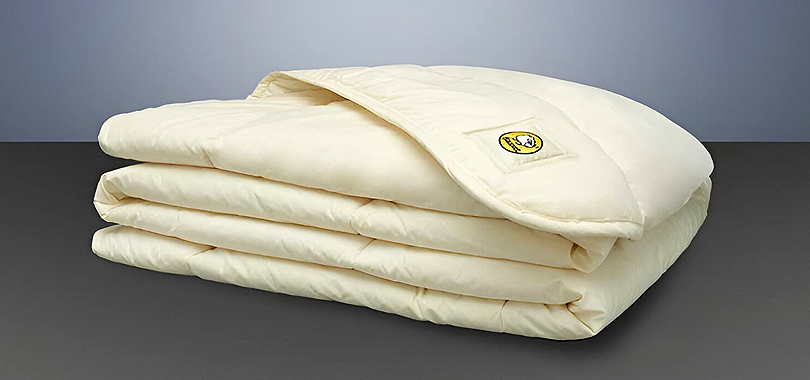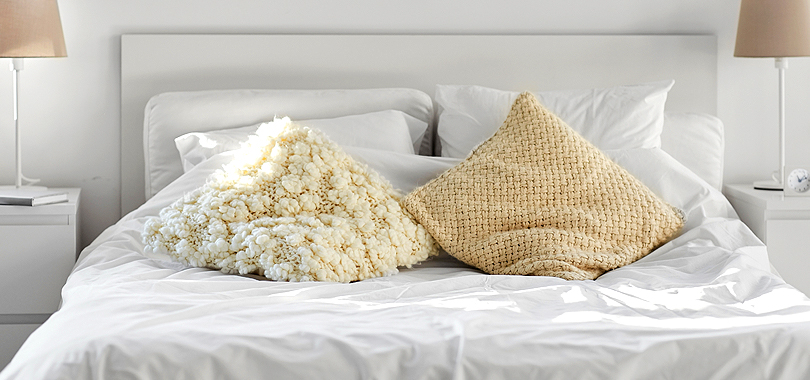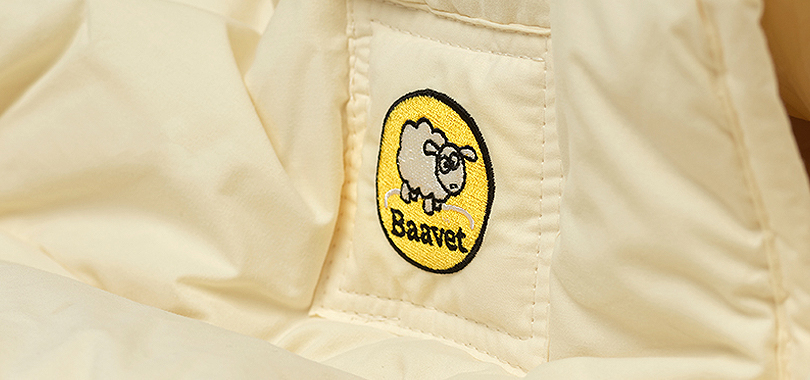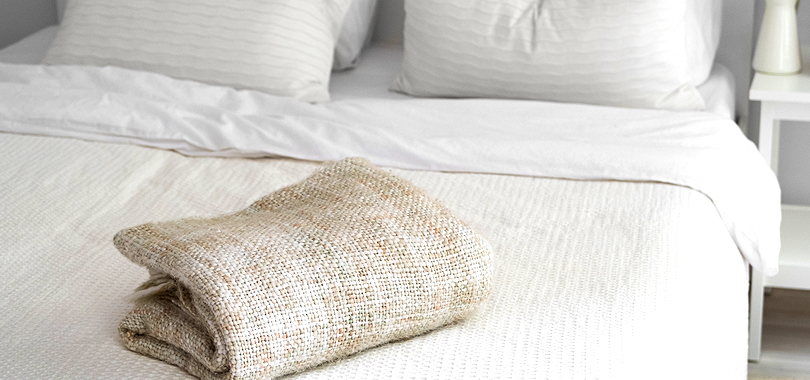

Wool Duvets Vs Down Duvets: Which Is Best?
Choosing the right duvet is key to getting a great night's sleep, but with so many options out there, it can be quite overwhelming to pick one. Among the many choices, wool and down duvets often stand out as popular options. In this article, we'll explore these two types of duvets to help you understand their differences and decide which one might be the best fit for your comfort and needs.

What Are Wool Duvets?
Wool duvets are made from the natural fibres sheared from sheep, which are then cleaned and transformed into a fluffy, insulating filling. This renewable resource is not only celebrated for its environmental friendliness but also for its remarkable properties that enhance sleep quality. Let's explore how wool stands out.
Thermal Regulation
One of wool’s standout features is its exceptional ability to regulate temperature, a trait that makes traditional tog ratings less relevant. Unlike synthetic materials, which are measured for insulation capabilities with tog ratings, wool operates on a different level. Wool fibres naturally react to changes in body temperature and moisture levels, adjusting accordingly by either breathing to release excess heat and moisture or retaining warmth to keep you comfortable. This dynamic interaction with your body ensures a comfortable sleeping environment throughout the year, often making separate seasonal duvets unnecessary.
Wool's adaptability shines in its ability to provide substantial warmth without the bulk. This contradicts the common misconception that effective insulation requires heavy bedding, showcasing wool's lightweight yet warm characteristics.Wool duvets come in varying weights, yet none of our Bavvet’s feel heavy. They are tailored to meet different climatic needs without strictly adhering to tog ratings. Our Baavet’s come in:
Super Lightweight Wool Duvets (approximately 200-250gms of wool per square metre): Ideal for the warmer seasons and people who overheat or suffer from night sweats, or prefer lightweight duvets on the bed.
Lightweight Wool Duvets (approximately 300/350 grams per square metre): Ideal for warmer seasons or for those who prefer a lighter duvet that can also serve as a throw on very cold winter nights.
Medium Weight Wool Duvets (approximately 400/450 grams per square metre): The most versatile option, suitable for use throughout most of the year, except during the warmest and coldest periods.
Winter Weight Wool Duvets (approximately 500/550 grams per square metre): Designed for those who are especially sensitive to cold or reside in particularly chilly environments.
Moisture Wicking
Beyond temperature control, wool’s ability to wick away moisture significantly enhances its comfort as a bedding material. It can absorb a substantial portion of its weight in moisture without feeling damp, reducing the clamminess often associated with nighttime sweating. This also makes wool inherently resistant to mildew and mould.
Hypoallergenic Properties
Wool is an excellent choice for those who suffer from allergies or asthma due to its natural hypoallergenic properties. Unlike synthetic fibres and down, which can sometimes harbour allergens unless specially treated, wool inherently provides a barrier against common bedroom allergens such as dust mites, bacteria, and mould. The natural moisture management of wool fibres makes the bedding less hospitable to dust mites, which prefer more humid environments. By effectively wicking away moisture from the body and releasing it into the air, wool ensures the bedding remains drier and cooler, significantly reducing the potential for allergens to thrive. Additionally, the structure of wool fibres naturally resists dirt and debris, helping to maintain a cleaner sleep environment. This property is particularly beneficial for allergy and asthma sufferers, as it minimises the presence of airborne allergens that can trigger symptoms.
Durability and Maintenance
Wool fibres are naturally durable and elastic, which means a wool duvet can maintain its shape and fluffiness for years with proper care. Although wool duvets typically require less frequent washing than other types, regular airing and spot cleaning are recommended. Ours can also be machine washed on a very, very gentle cycle if absolutely necessary.
Comfort and Weight
Wool duvets are beautifully light yet provide exceptional warmth. They balance the body’s temperature effectively, ensuring you neither overheat nor feel chilly. This comfort is achieved without the heaviness associated with many other duvet types, promoting excellent air circulation and enhancing their overall comfort factor.
Sustainability and Source
Wool is a sustainable fibre as sheep produce new fleece annually, making wool a truly renewable resource. The process of shearing wool from sheep is not only essential for the animal's welfare—keeping them cool and comfortable—but also benefits the environment by providing a natural, biodegradable material.
Once a wool duvet reaches the end of its useful life (if it ever does!), it can decompose naturally, enriching the soil with nutrients. This makes wool an excellent choice for eco-conscious consumers looking for products that have a minimal environmental footprint.
In addition to being renewable, our wool duvets offer full traceability. This means you can trace the wool back to the very farm that contributed to your duvet, ensuring transparency and accountability in how the wool was sourced. This traceability also reassures you that the wool is harvested in a sustainable manner that supports not just the environment but also the local farming communities.

What Are Down Duvets?
Down duvets are filled with the fine feathers from the undercoating of ducks or geese. These duvets are known for their light weight and insulating properties.
However, they do come with certain limitations in terms of temperature regulation and maintenance.
Lightweight and Insulating
Down's structure allows it to trap air effectively, which helps retain warmth. This makes down duvets ideally suited for colder conditions where maintaining heat is essential.
However, while the insulation is beneficial in cold weather, it becomes a disadvantage in varied or warmer climates. Unlike materials like wool that adapt to the body's changing temperatures, down continues to insulate even when it becomes too warm. This lack of effective temperature regulation can disrupt sleep by causing overheating. Proper sleep requires a slight decrease in body temperature to facilitate a dormant sleep state. Unfortunately, the constant insulation provided by down can lead to tossing and turning, or the need to throw off the duvet to cool down—only to pull it back on as you become too cold.
Customisable Warmth with Tog Ratings
Down duvets offer a range of tog ratings, each suited to different seasonal temperatures. While this allows control over your sleeping environment, it also means you might need multiple duvets throughout the year to stay comfortable. In summer, a lower tog rating keeps you cooler, and in winter, a higher tog rating ensures warmth.
This necessity to switch duvets according to the seasons can be less convenient and might require additional storage space and investment.
Allergy Considerations and Maintenance
Down duvets require careful maintenance to keep them hypoallergenic. Down can attract dust and provide a habitat for mites if not properly maintained. Regular cleaning and airing are necessary to ensure the duvet remains hygienic and free of allergens.
Additionally, down duvets must be fluffed regularly to maintain their loft and even distribution of feathers, which prevents cold spots.
Material Source and Ethical Considerations
The sourcing of down raises ethical concerns, particularly around practices such as live-plucking and conditions in the meat industry where down is often a by-product. To address these issues, certifications like the Responsible Down Standard (RDS) ensure that down is harvested without causing harm to birds, including prohibiting live-plucking and force-feeding.
Despite these certifications, challenges remain in fully verifying ethical practices throughout the down supply chain, making transparency difficult.
Consumers should seek out duvets filled with down that adheres to ethical standards, such as those certified by the Responsible Down Standard (RDS), ensuring the down was obtained in humane ways. Investigating and choosing brands that commit to these practices is crucial for responsible consumption.
Cost Factors
Initially, down may seem like a cost-effective option, but it is important to consider the long-term aspects. The need for professional cleaning and the potential for decreased loft over time without proper care can lead to higher costs in the long run.

Comparison of Key Features
Let's take a closer look at how wool and down duvets compare on some key features. This table breaks down their differences in warmth, insulation, maintenance, and more, so you can see which type might be the best fit for your bed.
Feature
Wool Duvets
Down Duvets
Warmth & Insulation
Excellent at regulating temperature, suitable for both warm and cold climates.
Provides good insulation, ideal for cold climates but may cause overheating in warmer conditions.
Breathability
High breathability, manages moisture well to keep dry and comfortable.
Reasonably breathable but can retain moisture leading to discomfort.
Allergies & Sensitivity
Naturally hypoallergenic, resistant to dust mites, mould, and mildew.
Can attract dust mites and allergens unless specially treated.
Durability
Highly durable, maintains shape and loft over time.
Requires regular fluffing and careful washing to maintain loft and effectiveness.
Maintenance
Generally requires less frequent washing, can be machine washed gently.
Needs professional cleaning or special care to prevent clumping and preserve quality.
Weight & Comfort
Lightweight yet warm, offering a comfortable balance that does not overheat or feel too chilly.
Light but lacks adaptive temperature control, which can lead to discomfort in varying temperatures.
Cost
Initially more expensive but offers better long-term value due to durability and low maintenance.
Varies widely, with higher quality down being more expensive.
Environmental & Ethical Impact
Sustainably sourced, ethical, biodegradable, and less impact on animal welfare.
Concerns about animal welfare in down production, environmental impact of processing.

Pros and Cons of Wool and Down Duvets
Let’s look into the pros and cons of each type of duvet to help you understand what you can expect from them in everyday use. Whether you’re allergy-prone, looking for eco-friendly options, or just want the cosiest sleep possible, this breakdown will help you work out what’s best for your bed.
Wool Duvets
Pros:
-
Superior Temperature Regulation: Wool duvets excel in maintaining a comfortable sleeping temperature throughout the night. They adapt to changes in body temperature, ensuring you stay warm without overheating, which is particularly beneficial for those who experience night sweats or live in climates with significant temperature fluctuations.
-
Hypoallergenic Properties: Wool is naturally resistant to dust mites, mould, and mildew, making it an ideal choice for allergy sufferers. This hypoallergenic nature helps improve indoor air quality and can significantly enhance sleep comfort for those with respiratory issues.
-
Durability and Ease of Care: Wool’s natural elasticity helps it maintain its shape and loft longer than down, reducing the need for frequent replacement. Wool duvets are also easier to care for at home, often requiring only occasional washing and regular airing.
-
Environmental and Ethical Benefits: Sourcing wool has a lower impact on animal welfare compared to down. It is a renewable resource, and wool duvets are biodegradable, aligning with sustainable living practices.
-
Weight and Texture: Wool duvets provide a light yet embracing feel that enhances comfort without the bulk. Their balanced weight helps to improve the sleep experience by ensuring you feel snug without feeling weighed down.
Cons:
-
Frankly, we can't think of any significant negatives. Wool's versatility and range of benefits make it a standout choice for almost every duvet user.
Down Duvets
Pros:
-
Lightweight and Comfort: Down is prized for its light weight and softness.
-
Good Insulator: Best for colder climates, providing warmth with minimal bulk.
Cons:
-
Temperature Fluctuations: Unlike wool, down does not regulate temperature well, which can lead to discomfort in varied climates. This might result in a sleeper feeling too hot, especially if the bedroom’s temperature rises during the night.
-
Allergy Issues: Down can attract and retain dust and allergens unless specifically treated. Those with allergies might find down duvets exacerbate their symptoms.
-
Maintenance and Durability: Requires consistent care to maintain its shape and loft, including regular fluffing and professional cleaning, which can add to long-term maintenance costs.
-
Ethical and Environmental Concerns: The production of down often involves practices that raise concerns about animal welfare, such as live-plucking. The environmental impact is also notable, particularly if the down is not sourced responsibly.

Which Duvet Filling Should I Choose?
When choosing between a wool and down duvet, consider what matters most for your comfort and health. Wool duvets offer unparalleled hypoallergenic properties and excellent temperature regulation, making them an excellent choice for anyone looking to enhance their sleep quality. While down duvets provide exceptional warmth and lightness, they do not regulate body temperature as effectively. This can lead to a restless sleep—whether you notice it or not.
Here at Baavet we highly recommend wool duvets because we truly believe they significantly outweigh other materials in their benefits. Wool's natural ability to adjust to your body’s temperature not only promotes uninterrupted sleep but also supports sustainable practices.

